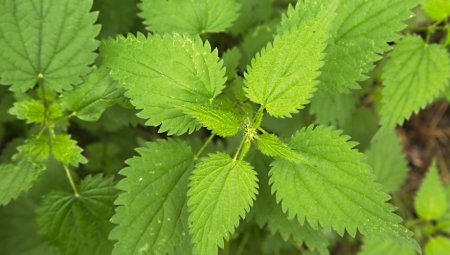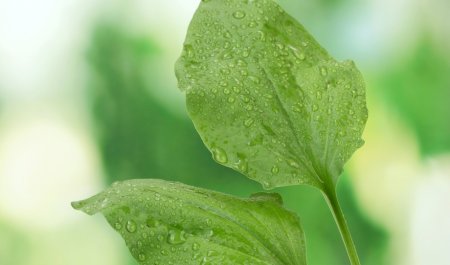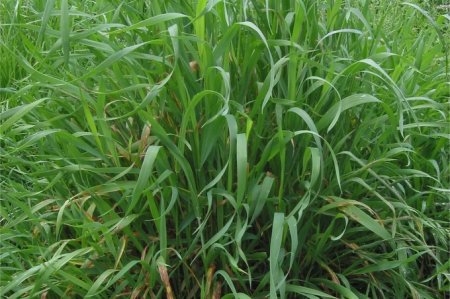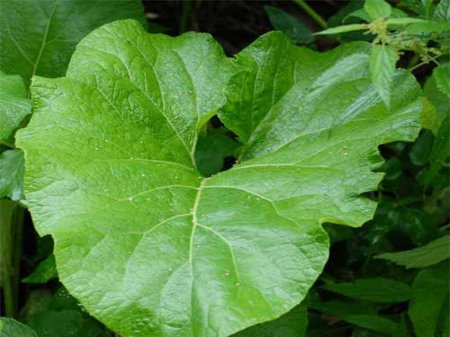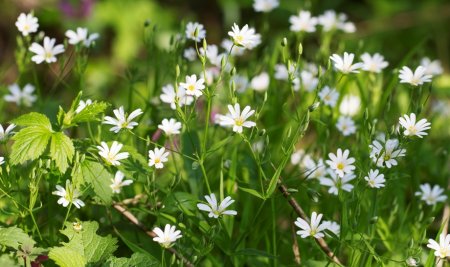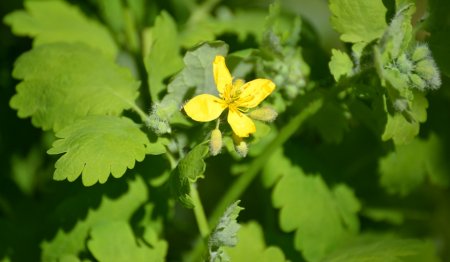7 weeds, health benefits
1. Nettle.
Nettle is rightly considered an essential plant with near perfect composition for human health. Until a few decades ago a young nettle leaves in salads, drinks, first dishes to be found on almost every table. Nettle - an absolute leader in the content of vitamin C (2 times more than in lemons), carotene and certain trace elements (iron, copper, chromium, manganese, etc.) among the majority of fruit and vegetables. The high content of organic acids (gallusovoy, formic) makes nettles effective way to strengthen the immune system. For example, a decoction of the plant is recommended to take orally in order to increase body resistance to pathogens and parasites, as well as a tonic in the postoperative period.
Indispensable nettle in the treatment of gastrointestinal diseases, colds, gynecological diseases. Especially the use of the plant effectively in cosmetology: decoction of nettle is famous for the fact that strengthens the hair and removes dandruff. It is important to remember that the use nettles caution should people suffering from thrombophlebitis, atherosclerosis, hypertension, as well as pregnant women.
2. Plantain
Another useful weeds that can be easily found on the footpath near the house - plantain. It is well known antiseptic properties of the plant, which almost everyone at least once applied to the wound for fast healing. His action is required plantain presence in its composition S-methylmethionine or vitamin U - a substance with a pronounced wound-healing effect. Due to vitamin U and the plant is indispensable in the treatment of digestive tract ulcer disease (on the background of low acidity) - it is 5-7 g of dry plantain brewed in a glass of water and take 3 times a day for 2-3 months.
Also noteworthy and sedative (calming) psyllium property, which is considered a natural antidepressant. The plant regulates cholesterol metabolism, responsible for the production of "happiness hormone" serotonin and normalizes mood and also neutralizes the toxins enter the body.
Use psyllium inside is contraindicated in people with gastric hypersecretion (increased acidity) and the tendency to form blood clots.
3. Wheat grass
This evergreen weed, from which the fighting spread all gardeners central Russia, in fact - a medicinal plant, which forces the removal of many ailments. No coincidence that wheatgrass choose animals for regular cleansing of the stomach. Despite its unprepossessing appearance, this plant - one of the most effective diaphoretic, diuretic, expectorant, anti-inflammatory, enveloping, and even laxatives. A decoction of dried plants (25 g per 200 ml of boiling water) is used internally for bronchitis, rheumatism, hemorrhoids, pyelonephritis, pulmonary tuberculosis, and bathtubs from the rhizomes of couch grass is successfully treated, most of the skin diseases.
As with any plant, when ingested wheatgrass has contraindications: grass can not drink for stomach ulcers, pancreatitis, diarrhea, and hypotension.
4. Burdock
Healing properties of burdock known for a long time: from the earliest times of the broad leaves of prepared salads and the roots are roasted and used for brewing coffee beverage. Today, burdock is grown in Japan as vegetables, root crops from which prepared the rich nutrients soups, side dishes, cakes. It is believed that regular consumption of burdock food is excellent prevention of diseases of the gastrointestinal tract, diabetes, kidney disease, worm infestations. Experimentally proved and antitumor activity of the plant, inhibits the proliferation of cancer cells.
Externally the juice is widely used burdock for burns, abrasions, cuts, inflammations, abrasions and other skin diseases. A decoction of the plant is practically harmless, but it is not recommended to use during pregnancy and breastfeeding.
5. Woodlouse
Pulling woodlice- branched plant, prefers moist soil to grow - we do not even suspect, from a valuable medicinal raw materials and vitamins get rid. Nature endowed the plant rich composition: for example, the vitamin C content in Mokrice and a half times more than in lemons and only 20 g of grass contain carotene daily norm - a substance that is responsible for many of the biological processes in the body.
Adding fresh salads woodlice can cope with thyroid disease, gastrointestinal tract, hypertension, breast pain, and loss of strength, scurvy and anemia. In addition, the plant is known for its choleretic and antiseptic properties. Thanks to hypoallergenic and safety woodlice it can be used for the treatment of small children - but people suffering from hypotension should be aware of its ability to reduce blood pressure.
6. Celandine
Celandine - a poisonous plant, mistakenly reckoned to weed that the skillful use can save people from many diseases. The most effective use of its external, as wound healing, bactericidal, anti-fungal agent, helps cleanse the skin. For these purposes, a bath with celandine, tincture and its milky juice in its pure form. This unpretentious weed can be called an effective medicine against stomach diseases of bones, joints, female sexual organs and nervous system. In addition, its scientifically proven anti-carcinogenic properties. Drink infusion of celandine inside with great care, starting with 3-5 drops per day, gradually, within 4 months of bringing their number to 50. It is important to know that excess dosage can cause cardiac arrhythmia, the occurrence of seizures, and even death from cardiac arrest, therefore prescribe medication and monitor its use should only be a doctor.
7. Quinoa
The beneficial properties of quinoa - "grass flour," which mercilessly destroy all growers of the country - little known today. However, our ancestors noticed that protein-rich plant nutritionally not much inferior to proteins of animal origin. It is because of quinoa in the lean war years and made cakes, to save people from starvation. The fresh leaves of quinoa can be used in salads, soup, soups, side dishes, as well as serve as a diuretic, expectorant, carminative and anti-bacterial agent, effectively cleanses the body of toxins. A poultice of the leaves of plants treated arthritic swelling, hemorrhoids, joint swelling. It is important to remember that the use of quinoa, in spite of its many beneficial properties, it is better not to abuse people with chronic diseases of the gastrointestinal tract, as well as kidney stones and gallstones.
Nettle is rightly considered an essential plant with near perfect composition for human health. Until a few decades ago a young nettle leaves in salads, drinks, first dishes to be found on almost every table. Nettle - an absolute leader in the content of vitamin C (2 times more than in lemons), carotene and certain trace elements (iron, copper, chromium, manganese, etc.) among the majority of fruit and vegetables. The high content of organic acids (gallusovoy, formic) makes nettles effective way to strengthen the immune system. For example, a decoction of the plant is recommended to take orally in order to increase body resistance to pathogens and parasites, as well as a tonic in the postoperative period.
Indispensable nettle in the treatment of gastrointestinal diseases, colds, gynecological diseases. Especially the use of the plant effectively in cosmetology: decoction of nettle is famous for the fact that strengthens the hair and removes dandruff. It is important to remember that the use nettles caution should people suffering from thrombophlebitis, atherosclerosis, hypertension, as well as pregnant women.
2. Plantain
Another useful weeds that can be easily found on the footpath near the house - plantain. It is well known antiseptic properties of the plant, which almost everyone at least once applied to the wound for fast healing. His action is required plantain presence in its composition S-methylmethionine or vitamin U - a substance with a pronounced wound-healing effect. Due to vitamin U and the plant is indispensable in the treatment of digestive tract ulcer disease (on the background of low acidity) - it is 5-7 g of dry plantain brewed in a glass of water and take 3 times a day for 2-3 months.
Also noteworthy and sedative (calming) psyllium property, which is considered a natural antidepressant. The plant regulates cholesterol metabolism, responsible for the production of "happiness hormone" serotonin and normalizes mood and also neutralizes the toxins enter the body.
Use psyllium inside is contraindicated in people with gastric hypersecretion (increased acidity) and the tendency to form blood clots.
3. Wheat grass
This evergreen weed, from which the fighting spread all gardeners central Russia, in fact - a medicinal plant, which forces the removal of many ailments. No coincidence that wheatgrass choose animals for regular cleansing of the stomach. Despite its unprepossessing appearance, this plant - one of the most effective diaphoretic, diuretic, expectorant, anti-inflammatory, enveloping, and even laxatives. A decoction of dried plants (25 g per 200 ml of boiling water) is used internally for bronchitis, rheumatism, hemorrhoids, pyelonephritis, pulmonary tuberculosis, and bathtubs from the rhizomes of couch grass is successfully treated, most of the skin diseases.
As with any plant, when ingested wheatgrass has contraindications: grass can not drink for stomach ulcers, pancreatitis, diarrhea, and hypotension.
4. Burdock
Healing properties of burdock known for a long time: from the earliest times of the broad leaves of prepared salads and the roots are roasted and used for brewing coffee beverage. Today, burdock is grown in Japan as vegetables, root crops from which prepared the rich nutrients soups, side dishes, cakes. It is believed that regular consumption of burdock food is excellent prevention of diseases of the gastrointestinal tract, diabetes, kidney disease, worm infestations. Experimentally proved and antitumor activity of the plant, inhibits the proliferation of cancer cells.
Externally the juice is widely used burdock for burns, abrasions, cuts, inflammations, abrasions and other skin diseases. A decoction of the plant is practically harmless, but it is not recommended to use during pregnancy and breastfeeding.
5. Woodlouse
Pulling woodlice- branched plant, prefers moist soil to grow - we do not even suspect, from a valuable medicinal raw materials and vitamins get rid. Nature endowed the plant rich composition: for example, the vitamin C content in Mokrice and a half times more than in lemons and only 20 g of grass contain carotene daily norm - a substance that is responsible for many of the biological processes in the body.
Adding fresh salads woodlice can cope with thyroid disease, gastrointestinal tract, hypertension, breast pain, and loss of strength, scurvy and anemia. In addition, the plant is known for its choleretic and antiseptic properties. Thanks to hypoallergenic and safety woodlice it can be used for the treatment of small children - but people suffering from hypotension should be aware of its ability to reduce blood pressure.
6. Celandine
Celandine - a poisonous plant, mistakenly reckoned to weed that the skillful use can save people from many diseases. The most effective use of its external, as wound healing, bactericidal, anti-fungal agent, helps cleanse the skin. For these purposes, a bath with celandine, tincture and its milky juice in its pure form. This unpretentious weed can be called an effective medicine against stomach diseases of bones, joints, female sexual organs and nervous system. In addition, its scientifically proven anti-carcinogenic properties. Drink infusion of celandine inside with great care, starting with 3-5 drops per day, gradually, within 4 months of bringing their number to 50. It is important to know that excess dosage can cause cardiac arrhythmia, the occurrence of seizures, and even death from cardiac arrest, therefore prescribe medication and monitor its use should only be a doctor.
7. Quinoa
The beneficial properties of quinoa - "grass flour," which mercilessly destroy all growers of the country - little known today. However, our ancestors noticed that protein-rich plant nutritionally not much inferior to proteins of animal origin. It is because of quinoa in the lean war years and made cakes, to save people from starvation. The fresh leaves of quinoa can be used in salads, soup, soups, side dishes, as well as serve as a diuretic, expectorant, carminative and anti-bacterial agent, effectively cleanses the body of toxins. A poultice of the leaves of plants treated arthritic swelling, hemorrhoids, joint swelling. It is important to remember that the use of quinoa, in spite of its many beneficial properties, it is better not to abuse people with chronic diseases of the gastrointestinal tract, as well as kidney stones and gallstones.
